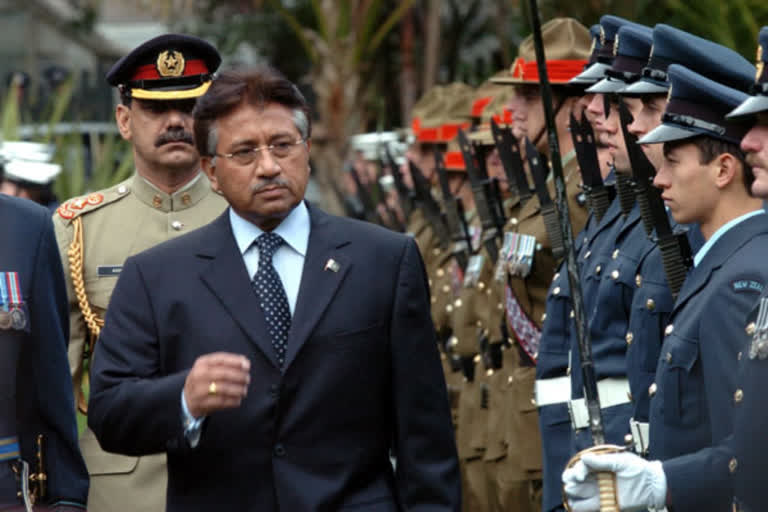Kolkata: Musharraf once wrote - “I have confronted death and defied it several times in the past because destiny and fate have always smiled on me. I only pray that I have more than the proverbial nine lives of a cat.” Whether he was blessed with nine lives of a cat or not is a million-dollar question, but the fact remains that the former President of Pakistan has survived at least six assassination attempts and lastly a rumour in June 2022 that nearly ended his life.
Musharraf-- though not a very extolled name in India because during his tenure as the President of Pakistan between 1999 and 2007 the tension between the two countries reached an apex--the flashpoint being the ‘Kargil War’ in 1999, but it is also obvious that after Mikhael Gorbachev, he was perhaps the most discussed and colourful politician and statesman in world politics in recent years.
Born in Delhi on 11 August 1943, Musharraf’s family like millions of other Muslims moved to the newly created Pakistan in 1947 after the partition and got settled in Karachi. Musharraf completed his early education in Lahore and Karachi before entering the Pakistan Military Academy in 1961. Considered to be a born fighter, Musharraf served in the Indo-Pakistani war of 1965 as a company commander and rose to the top job in 1998 after the resignation of Pakistan's Army Chief Gen Jehangir Karamat.
Interestingly enough, Musharraf was christened to the top post of the army at a time when Pakistan’s civilian government led by Prime Minister Nawaz Sharif was becoming powerful. However, Sharif’s bid to remove Musharraf and take control of the army was foiled because it was resisted by senior army officials.
Also read:Former Pakistan military ruler Pervez Musharraf dies in Dubai
Musharraf, who was out of the country at the time, quickly returned to Pakistan and seized power in a bloodless coup - taking the title of chief executive. Pakistan's the then President Rafiq Tarar remained in office until June 2001 when Musharraf formally appointed himself as his replacement. Though Musharraf’s rise to power was seen as a bright spot to improve the bilateral ties between India and Pakistan, but the former Pakistan General preferred to follow the legacy of his predecessors and as a result tension escalated between the two countries. The tension reached a flashpoint when in 1999 India got engaged with its neighbour in a proxy war over the control of Kashmir.
India considered Musharraf as the architect of the 1999 conflict in Kargil and suspected Pakistan's army of involvement in the hijack of an Indian Airlines plane to Afghanistan the same year. Even after the war when India was trying to negotiate peace through dialogue, Musharraf was invited to India, but the landmark summit in 2001 on the long-running dispute over Kashmir ended inconclusively.
After the twin tower attack in September 2001, Musharraf was torn between the US diplomatic demands to allow the superpower to use Pakistan soil for the eradication of Islamic fundamentalists and the country’s internal political and military pressure. The Pak President finally supported the American-led military campaign to oust the Taliban regime in neighbouring Afghanistan.
In January 2002, he issued a strong condemnation of extremism, pledging to fight Islamist terrorism in Pakistan. He also banned all foreign funding of mosques and Islamic education centres and limited the number of foreign students coming to Pakistan for Islamic studies. Giving in to the country’s internal demand, Musharraf, in October 2002 conducted a general election and won with a comfortable majority although the opposition effectively blocked any proceedings in the National Assembly for more than 12 months. During his tenure, he not only legitimised the coup in 1999, but earned accolades across the globe for his efforts to curb terrorism and also for turning around the decline in the economic growth of the country.
The pressure on his rule increased in 2007 following his decision to suspend the Chief Justice, Iftikhar Muhammad Chaudhry, accusing him of corruption. A huge protest by the country's lawyers saw the Supreme Court eventually reinstate the chief justice and dismiss all allegations of misconduct. The pressure started to increase and the students and pro-Islamic parties condemned Musharraf for his pro-Western policies.
Musharraf's political career of nine years ended when he resigned after Benazir Bhutto came back to power in 2008. He retired and went into a self-imposed exile in London and Dubai. Musharraf again returned to Pakistan in 2013 to take part in the election, but was barred from doing that. He was embroiled in a slew of investigations, including one for treason relating to his imposition of the 2007 state of emergency. Musharraf was guilty and was sentenced to death. But with Musharraf in self-imposed exile in Dubai, there was little chance of such a sentence ever being carried out. He was in Dubai till his death on Sunday.
